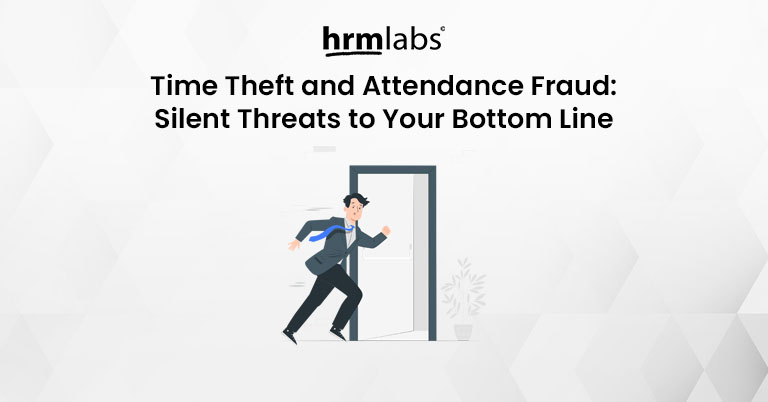Time theft, unfortunately, is a common challenge faced by businesses across industries. In the Philippines, where employee loyalty and trust are often high, it might seem like a distant problem. However, it’s essential to be vigilant to protect your business and ensure fair compensation for all employees.
In the fast-paced business environment of the Philippines, ensuring accurate timekeeping and attendance is crucial for maintaining productivity and profitability. Unfortunately, time theft and attendance fraud are common issues that can seriously undermine a company’s efficiency and bottom line.
These problems are often overlooked, but understanding them is essential for business leaders aiming to create a fair and transparent workplace.
What is Time Theft and Attendance Fraud?
Time theft occurs when employees are paid for time they did not actually work. This can happen through various means, such as buddy punching (where one employee clocks in for another), extended breaks, or manipulating clock-in/out times. Attendance fraud, on the other hand, involves falsifying attendance records to appear present when one is not. Both practices can lead to significant financial losses and create a culture of dishonesty within the workplace.
Why Should Philippine Businesses Be Aware?
For businesses in the Philippines, where labor costs and compliance are critical factors, time theft and attendance fraud can be particularly damaging. These practices not only drain company resources but also disrupt team dynamics and lower morale. Employees who work diligently may feel demotivated if they perceive that others are taking advantage of the system without consequences. Moreover, failure to address these issues can lead to larger problems with payroll accuracy and legal compliance.
The Impact on Business
- Financial Losses: Time theft can lead to substantial financial losses. Even minor discrepancies can accumulate over time, costing businesses thousands of pesos annually. In a competitive market, such losses can be the difference between thriving and struggling to stay afloat.
- Decreased Productivity: When employees engage in time theft or attendance fraud, overall productivity decreases. This not only affects the workload distribution but can also lead to missed deadlines and a decline in the quality of work.
- Legal Risks: In the Philippines, strict labor laws govern employee compensation and working hours. Businesses that fail to maintain accurate attendance records risk facing legal penalties, including fines and damage to their reputation.
How to Combat Time Theft and Attendance Fraud
Implement Advanced Timekeeping Solutions
Traditional timekeeping methods like manual punch cards or handwritten logs are more susceptible to manipulation. Investing in biometric systems or advanced software solutions can significantly reduce the chances of time theft and attendance fraud. These systems ensure that only the actual employee can clock in, eliminating buddy punching and other fraudulent practices.
Regular Audits and Monitoring
Conduct regular audits of attendance records to spot inconsistencies or patterns that may indicate fraud. Monitoring software can provide real-time data and alerts, allowing HR departments to take swift action if discrepancies are detected.
Create a Culture of Accountability
Promote a company culture that values honesty and transparency. Clear communication about the consequences of time theft and attendance fraud, combined with consistent enforcement, can deter employees from engaging in these practices.
Train Managers and Supervisors
Ensure that those in leadership positions are trained to recognize the signs of time theft and attendance fraud. They should also be equipped with the tools to address these issues promptly and effectively.
Incentivize Honesty
Consider implementing incentive programs that reward employees for maintaining good attendance records. Positive reinforcement can encourage honesty and discourage fraudulent behavior.
The Role of Technology in Preventing Fraud
In today’s digital age, technology plays a vital role in combating time theft and attendance fraud. Philippine businesses can benefit from integrating modern timekeeping and attendance systems that offer features such as biometric authentication, real-time tracking, and automated reports. These tools not only enhance accuracy but also provide valuable data insights that can help businesses optimize their workforce management strategies.
For instance, HRMLabs offers a comprehensive time and attendance management system designed to meet the specific needs of Filipino businesses. By utilizing cutting-edge technology, HRMLabs helps companies safeguard against time theft and attendance fraud while streamlining overall operations.
Conclusion
Time theft and attendance fraud are pressing concerns for businesses in the Philippines, impacting both financial health and workplace integrity. By understanding these issues and implementing effective strategies to combat them, companies can protect their resources and foster a culture of accountability and honesty. Investing in advanced timekeeping solutions and fostering open communication within the workplace are key steps toward overcoming these challenges and ensuring long-term success.
For businesses serious about tackling these issues, exploring modern solutions like HRMLabs can provide the necessary tools and support to maintain a fraud-free, productive environment.

